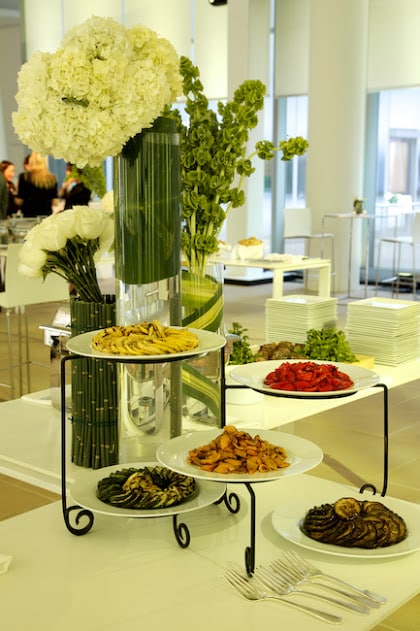Best Foods for Body Fuel at Conferences and Meetings
By Jennifer Kanikula

Your Menu Can Make or Break Your Next Event- Food for Thought is a Science!
In the setting of a conference, workspace, or classroom, where the mind is active, but the physical body is sedentary, finding the proper fuel can be difficult. Creating an environment that supports productivity, engagement, and information retention is crucial.
In general: calorie needs will be lower due to inactivity, but nutrient needs remain critical. It’s best to offer smaller meals and snacks to avoid after-meal slumps, (properly known as post-prandial.) Carbohydrate choices should be in form of whole grains and fresh fruit; protein and healthy fats in small amounts are necessary to help sustain satiety; and antioxidant rich foods are ideal for enhancing mental capacity. In the morning, all three main macronutrients are important. Carbohydrates will provide our brains with immediate fuel while protein and some healthy fats will help sustain satiety. Some examples of healthy food choices for breakfast include: yogurt with granola and fruit, eggs, and whole grain bread products with optional healthy fats like avocados or peanut butter.

Despite having breakfast, it almost seems inevitable that an attack of either hunger or sleepiness strikes before lunch. To combat this, eating and drinking something small yet nutritious between the hours of breakfast and lunch can give our brains and bodies a boost. Some examples of healthy snack foods that will help curve our appetite and stimulate our brains include: string cheese, fresh fruit, nuts, bite-sized chocolates, coffee, and fruit/herb infused water.
While making it to lunch may seem like a success alone, consuming a lunch that’s both filling and avoids the post-prandial slump would be an even bigger accomplishment! Like breakfast, all three macronutrients are important. However, especially during the middle of the day, our choice of carbohydrates and amount of carbohydrates should be carefully selected. Protein and vegetables should be the main component of the meal, carbohydrates should be either whole grains or fruit on the side, and some healthy fats drizzled in would be ideal to help prolong satiety. An example of a plate that follows these guidelines would be the following:
Main: Salmon (or other variation of fish or lean meat)
Side: Vegetable salad tossed in olive oil and vinegar
Side: Couscous/quinoa tossed with fresh herbs
Side: Fresh Fruit
Offer an afternoon snack similar to the morning snack, something light but still packed with nutrients. Examples of some good afternoon snack options would be: trail mix, vegetables and hummus, fresh fruit, fruit/herb infused water, and coffee.
Above all else, our bodies know exactly how to be healthy. They crave the nutrients we deeply desire to perform at our physical and mental best. Our job is to simply provide the ingredients.
Want some additional information from Jennifer Kanikula? Click here.




